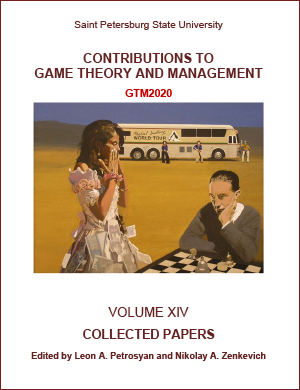Implementation of Subgame-Perfect Cooperative Agreement in an Extensive-Form Game
DOI:
https://doi.org/10.21638/11701/spbu31.2021.19Abstract
A novel approach to sustainable cooperation called subgame-perfect core (S-P Core) was introduced by P. Chander and M. Wooders in 2020 for n-person extensive-form games with terminal payoffs. This solution concept incorporates both subgame perfection and cooperation incentives and implies certain distribution of the total players' payoff at the terminal node of the cooperative history. We use in the paper an extension of the S-P Core to the class of extensive games with payoffs defined at all nodes of the game tree that is based on designing an appropriate payoff distribution procedure β and its implementation when a game unfolds along the cooperative history. The difference is that in accordance with this so-called β-subgame-perfect core the players can redistribute total current payoff at each node in the cooperative path. Moreover, a payoff distribution procedure from the β-S-P Core satisfies a number of good properties such as subgame efficiency, non-negativity and strict balance condition. In the paper, we examine different properties of the β-S-P Core, introduce several refinements of this cooperative solution and provide examples of its implementation in extensive-form games. Finally, we consider an application of the β-S-P Core to the symmetric discrete-time alternating-move model of fishery management.
Keywords:
extensive game, sustainable cooperation, subgame-perfect equilibrium, core, payoff distribution procedure, renewable resource extraction
Downloads
References
Downloads
Published
How to Cite
Issue
Section
License
Articles of "Contributions to Game Theory and Management" are open access distributed under the terms of the License Agreement with Saint Petersburg State University, which permits to the authors unrestricted distribution and self-archiving free of charge.




